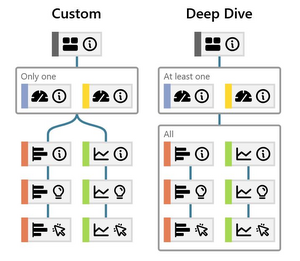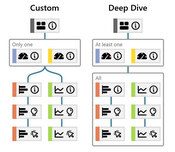Information
- Publication Type: PhD-Thesis
- Workgroup(s)/Project(s):
- Date: September 2024
- Date (Start): 11. October 2020
- Date (End): 26. September 2024
- TU Wien Library:
- Second Supervisor: W Aigner
- Open Access: yes
- 1st Reviewer: Eduard Gröller
- Rigorosum: 1. October 2024
- First Supervisor: Marc Streit
Abstract
Advancements in big data processing and interactive visualization tools have led to significant changes in how users analyze and explore their data. This thesis aims to address the challenges resulting from these changes through a two-step approach to support users. We first address the issues at the spreadsheet level before moving on to more complex visual representations in a dashboard environment. We use the Fuzzy Spreadsheet approach at the spreadsheet level to include uncertain information in the decision-making process. Our approach augments traditional spreadsheets with uncertain information where a cell can hold and display a distribution of values, in addition to other contextually relevant information, such as impact and relationship between cells, to convey sensitivity and robustness information to the user. When users transition from spreadsheet representations to advanced visualization tools such as interactive dashboards, they often face challenges related to their use that can lead them to revert to their old, familiar static analysis tools. With the help of dashboard onboarding, authors can communicate the intended use and purpose of their dashboards, along with the workings of visualizations present on the dashboards, to fill the user’s knowledge gap. We created a process model for dashboard onboarding that formalizes and unifies different onboarding strategies for dashboards and facilitates the design and implementation of new onboarding approaches. Using this process model as a base and drawing inspiration from the fields of data storytelling and open-world game design, we developed an approach for crafting semi-automated interactive dashboard tours (D-Tours) to produce an onboarding experience tailored to individual users while preserving their agency. We implemented this concept in a tool called D-Tour Prototype which allows authors to create D-Tours from scratch or using automatic templates. Finally, we provide future directions based on the insights from this thesis to explore the role of AI in the design and development of dashboard onboarding.Additional Files and Images
Weblinks
No further information available.BibTeX
@phdthesis{Dhanoa2024,
title = "From Analysis to Communication: Supporting Users in
Understanding Complex Spreadsheets and Dashboards",
author = "Vaishali Dhanoa",
year = "2024",
abstract = "Advancements in big data processing and interactive
visualization tools have led to significant changes in how
users analyze and explore their data. This thesis aims to
address the challenges resulting from these changes through
a two-step approach to support users. We first address the
issues at the spreadsheet level before moving on to more
complex visual representations in a dashboard environment.
We use the Fuzzy Spreadsheet approach at the spreadsheet
level to include uncertain information in the
decision-making process. Our approach augments traditional
spreadsheets with uncertain information where a cell can
hold and display a distribution of values, in addition to
other contextually relevant information, such as impact and
relationship between cells, to convey sensitivity and
robustness information to the user. When users transition
from spreadsheet representations to advanced visualization
tools such as interactive dashboards, they often face
challenges related to their use that can lead them to revert
to their old, familiar static analysis tools. With the help
of dashboard onboarding, authors can communicate the
intended use and purpose of their dashboards, along with the
workings of visualizations present on the dashboards, to
fill the user’s knowledge gap. We created a process model
for dashboard onboarding that formalizes and unifies
different onboarding strategies for dashboards and
facilitates the design and implementation of new onboarding
approaches. Using this process model as a base and drawing
inspiration from the fields of data storytelling and
open-world game design, we developed an approach for
crafting semi-automated interactive dashboard tours
(D-Tours) to produce an onboarding experience tailored to
individual users while preserving their agency. We
implemented this concept in a tool called D-Tour Prototype
which allows authors to create D-Tours from scratch or using
automatic templates. Finally, we provide future directions
based on the insights from this thesis to explore the role
of AI in the design and development of dashboard onboarding.",
month = sep,
address = "Favoritenstrasse 9-11/E193-02, A-1040 Vienna, Austria",
school = "Research Unit of Computer Graphics, Institute of Visual
Computing and Human-Centered Technology, Faculty of
Informatics, TU Wien ",
URL = "https://www.cg.tuwien.ac.at/research/publications/2024/Dhanoa2024/",
}


 image
image PhD Thesis
PhD Thesis
